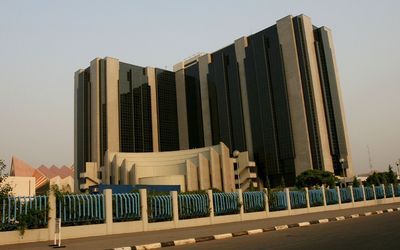Source:

Nigeria raises rates as economic crisis worsens
by Drew Hinshaw,
2016-03-23 11:37:50.0
NIGERIA’S central bank on Tuesday hiked its key lending rate four months after lowering it, as Africa’s largest economy navigates a perilous combination of record inflation and the worst growth in 17 years.
Governor Godwin Emefiele said the bank would lift the rate to 12%, up one percentage point. That is meant to curb inflation, which rose to a three-year high of 11.4%, last month: "The balance of risk should be tilted toward price stability," he said.
His announcement reflected a deepening crisis in Nigeria, which is Africa’s largest oil exporter and most populous nation. The rate hike wasn’t expected by many analysts; in November, the bank had lowered rates by two percentage points, hoping to stimulate an economy that grew just 2.8% last year, the slowest rate since 1999.
"The move caught me by surprise," said Manji Cheto, vice-president of London researcher Teneo Intelligence. "The way I read this decision is that the (bank) is signalling that its previous decision to loosen may have been premature and consequently, this is a corrective measure."
Low oil prices have put Nigeria in a bind. The country of 184-million, which has been among Africa’s fastest-growing economies over the last decade, now finds itself caught between rising inflation and tumbling growth. The central bank, which earns nearly all its foreign exchange from oil, is in particular trouble. Over the past year, it has watched reserves fall 20%, in tandem with crashing oil prices.
To preserve the $28bn of reserves remaining, the bank has introduced increasingly strict rules governing which businesses can buy dollars, and where. That has contributed to a deepening dollar scarcity. Manufacturers say they cannot find the dollars they need to buy spare parts, so some have closed. Local banks have said they’re struggling to pay off foreign lenders, and three have recently announced profit warnings. Three others have announced large layoffs.
The consequences have also been hard on ordinary Nigerians. Just outside the central bank itself, in the capital of Abuja on Tuesday, drivers lined up for hours at the few petrol stations still open. The central bank’s restrictions have also made it difficult for petrol stations to import fuel.
At one pump queue, tax driver Musa Gado had spent six hours lined up for petrol: "This Central Bank of Nigeria policy is wickedness," he said. "For God’s sake. I have been hear since morning. I have not worked for the whole of today. I don’t even know how I will feed my family."
More Africa news from The Wall Street Journal
More news from The Wall Street Journal
Premium access to WSJ.com: $1 a week for 12 weeks

Nigeria Central Bank. Picture: BLOOMBERG
NIGERIA’S central bank on Tuesday hiked its key lending rate four months after lowering it, as Africa’s largest economy navigates a perilous combination of record inflation and the worst growth in 17 years.
Governor Godwin Emefiele said the bank would lift the rate to 12%, up one percentage point. That is meant to curb inflation, which rose to a three-year high of 11.4%, last month: "The balance of risk should be tilted toward price stability," he said.
His announcement reflected a deepening crisis in Nigeria, which is Africa’s largest oil exporter and most populous nation. The rate hike wasn’t expected by many analysts; in November, the bank had lowered rates by two percentage points, hoping to stimulate an economy that grew just 2.8% last year, the slowest rate since 1999.
"The move caught me by surprise," said Manji Cheto, vice-president of London researcher Teneo Intelligence. "The way I read this decision is that the (bank) is signalling that its previous decision to loosen may have been premature and consequently, this is a corrective measure."
Low oil prices have put Nigeria in a bind. The country of 184-million, which has been among Africa’s fastest-growing economies over the last decade, now finds itself caught between rising inflation and tumbling growth. The central bank, which earns nearly all its foreign exchange from oil, is in particular trouble. Over the past year, it has watched reserves fall 20%, in tandem with crashing oil prices.
To preserve the $28bn of reserves remaining, the bank has introduced increasingly strict rules governing which businesses can buy dollars, and where. That has contributed to a deepening dollar scarcity. Manufacturers say they cannot find the dollars they need to buy spare parts, so some have closed. Local banks have said they’re struggling to pay off foreign lenders, and three have recently announced profit warnings. Three others have announced large layoffs.
The consequences have also been hard on ordinary Nigerians. Just outside the central bank itself, in the capital of Abuja on Tuesday, drivers lined up for hours at the few petrol stations still open. The central bank’s restrictions have also made it difficult for petrol stations to import fuel.
At one pump queue, tax driver Musa Gado had spent six hours lined up for petrol: "This Central Bank of Nigeria policy is wickedness," he said. "For God’s sake. I have been hear since morning. I have not worked for the whole of today. I don’t even know how I will feed my family."
More Africa news from The Wall Street Journal
More news from The Wall Street Journal
Premium access to WSJ.com: $1 a week for 12 weeks





















Change: -0.47%
Change: -0.57%
Change: -1.76%
Change: -0.34%
Change: 0.02%
Data supplied by Profile Data
Change: -1.49%
Change: 0.08%
Change: -0.47%
Change: 0.00%
Change: -0.04%
Data supplied by Profile Data
Change: -0.27%
Change: -0.22%
Change: -0.23%
Change: -0.22%
Change: -0.23%
Data supplied by Profile Data
Change: -0.28%
Change: -1.15%
Change: -0.07%
Change: -1.21%
Change: -0.22%
Data supplied by Profile Data